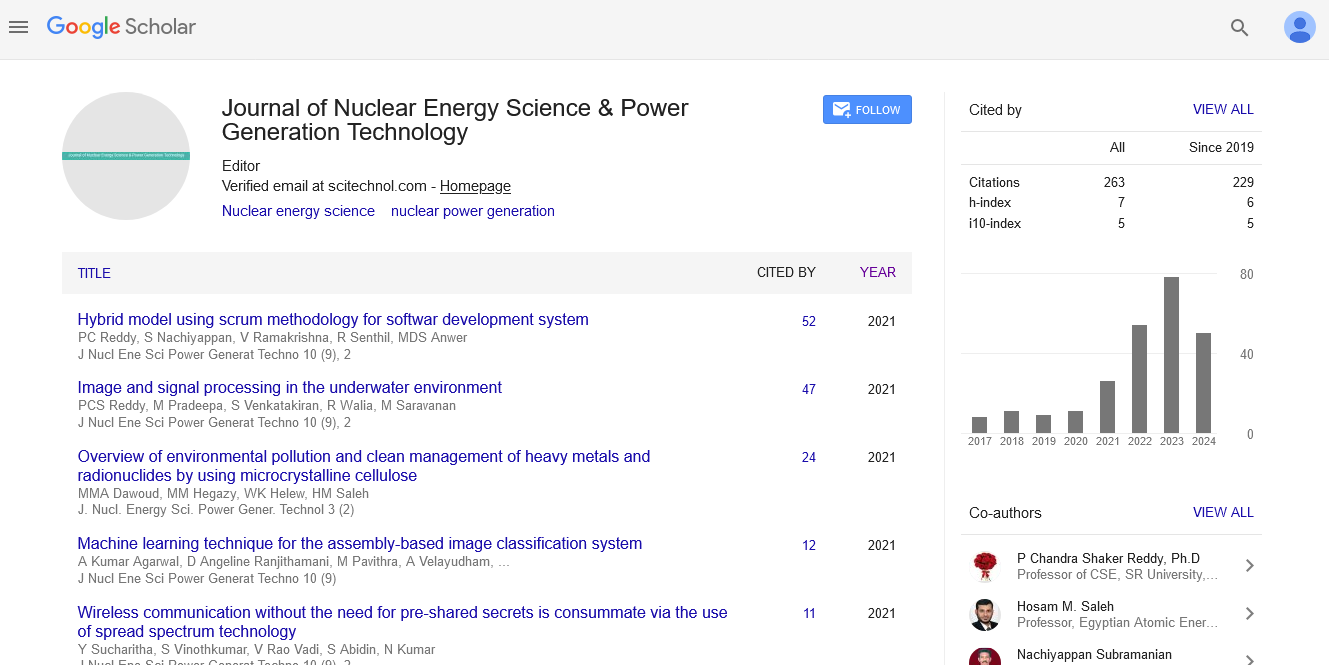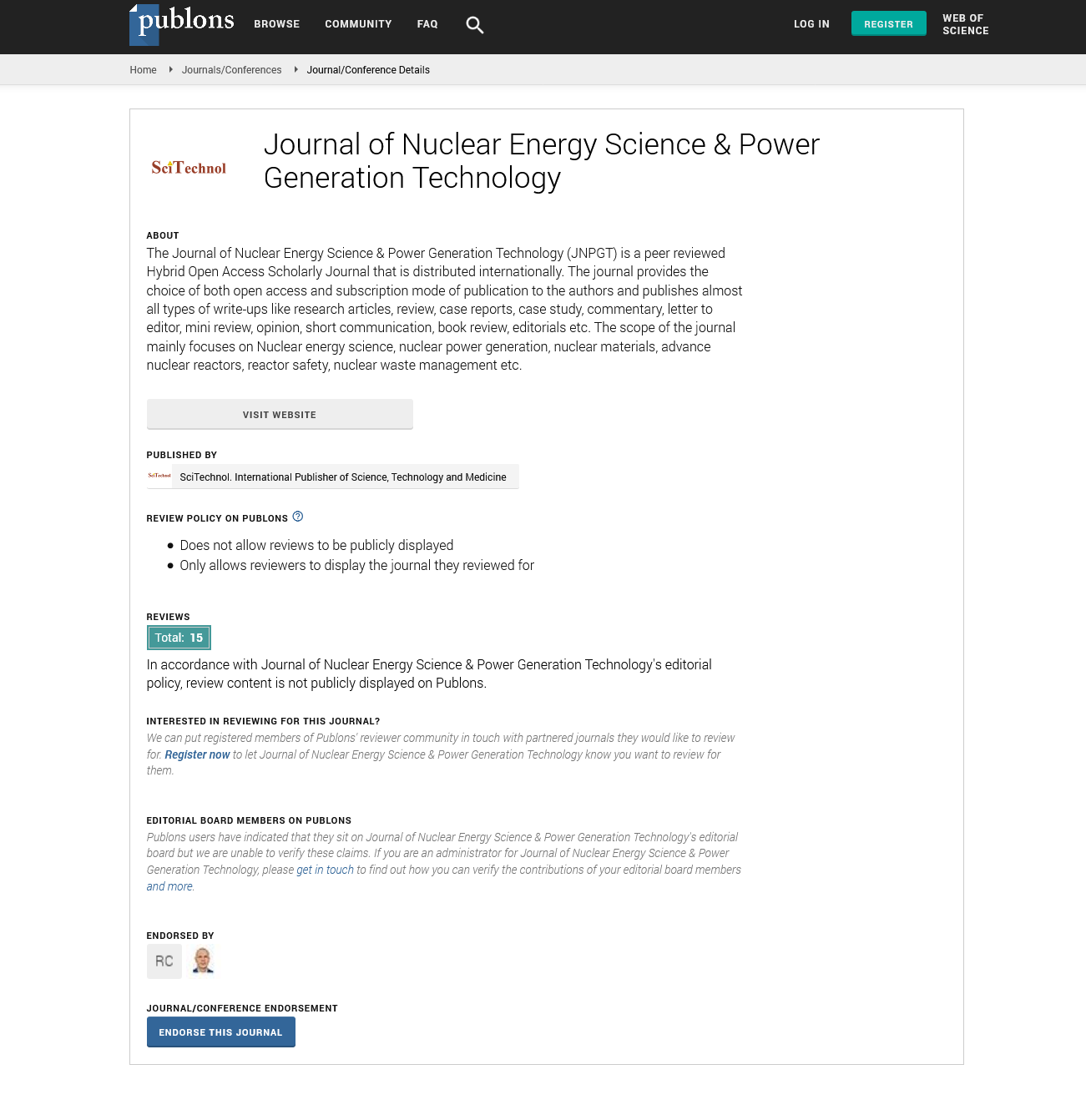Commentary, J Nucl Ene Sci Power Generat Technol Vol: 12 Issue: 2
Advantages, Challenges and Innovations in the Nuclear Fuel Cycle for Sustainable Energy Generation
Drump Unel*
Department of Environmental Sciences, Debre Tabor University, Debre Tabor, Ethiopia
*Corresponding Author: Drump Unel,
Department of Environmental Sciences, Debre Tabor University, Debre Tabor, Ethiopia
E-mail: drumpunel@hotmail.com
Received date: 27-Mar-2023, Manuscript No. JNPGT-23-95569;
Editor assigned date: 29-Mar-2023, PreQC No. JNPGT-23-95569 (PQ);
Reviewed date: 13-Apr-2023, QC No. JNPGT-23-95569;
Revised date: 21-Apr-2023, Manuscript No. JNPGT-23-95569 (R);
Published date: 01-May-2023, DOI: 10.4172/2325-9809.1000329.
Citation: Unel D (2023) Advantages, Challenges and Innovations in the Nuclear Fuel Cycle for Sustainable Energy Generation. J Nucl Ene Sci Power Generat Technol 12:2.
Description
Nuclear energy has been recognized as a reliable and low-carbon source of electricity generation, contributing to global energy supply and addressing climate change concerns. The nuclear fuel cycle, which encompasses the processes involved in the production, use, and disposal of nuclear fuel, plays a crucial role in supporting nuclear energy production. However, it is a complex and multifaceted process that requires careful consideration of various technical, economic, environmental and social factors.
Advantages
There are several advantages to using nuclear energy as a source of power, including:
Low carbon emissions: Nuclear energy has a low carbon footprint compared to fossil fuel-based electricity generation, as it does not produce greenhouse gases during electricity production.
Reliable and dispatchable: Nuclear power plants can provide base load electricity, which is crucial for grid stability and energy security, as they can operate continuously for extended periods without interruptions.
High energy density: Nuclear fuel has a much higher energy density compared to other conventional fuels, such as coal or natural gas, which means that a small amount of nuclear fuel can produce a large amount of electricity.
Energy independence: Nuclear power can reduce dependence on fossil fuels, particularly for countries that do not have significant domestic fossil fuel reserves, and can provide a stable and secure source of energy.
Economic benefits: The nuclear fuel cycle can contribute to economic growth through job creation, local revenue generation, and technological innovation in areas such as reactor design, fuel fabrication, and waste management.
Challenges
Nuclear energy, like any other form of energy production, presents a range of challenges that need to be carefully considered. Some of the most significant challenges of nuclear energy include:
Safety concerns: The safe operation of nuclear reactors and the management of radioactive waste are critical challenges in the nuclear fuel cycle. Accidents such as the Chernobyl and Fukushima disasters have raised concerns about the potential for catastrophic releases of radiation and their impact on human health and the environment.
Proliferation risks: The use of enriched uranium and plutonium in the nuclear fuel cycle raises concerns about the potential for nuclear weapons proliferation. The reprocessing of spent fuel to extract plutonium can pose risks of diversion for military purposes, and strict safeguards and security measures are required to prevent unauthorized access to nuclear materials.
Waste management: The disposal of radioactive waste, particularly high-level waste, requires long-term isolation from the environment and poses challenges in terms of site selection, engineering design, transportation, and stakeholder engagement. The issue of radioactive waste disposal also raises public perception concerns and requires effective communication and engagement with local communities.
Cost and economics: The construction and operation of nuclear power plants can be capital-intensive, and the economics of nuclear power can be influenced by factors such as the cost of uranium, regulatory requirements, and public acceptance. The long-term management and disposal of radioactive waste can also add to the overall costs of the nuclear fuel cycle.
Advanced reactor technologies
There is on-going research and development in advanced reactor technologies, such as Generation IV reactors, which aim to improve the safety, efficiency, and sustainability of nuclear power. These advanced reactors offer potential benefits such as higher fuel utilization, reduced waste production, and enhanced safety features. However, their commercial deployment still requires further technological development, regulatory frameworks, and public acceptance.
Nuclear fuel cycle sustainability
Efforts are being made to improve the sustainability of the nuclear fuel cycle, including advances in fuel fabrication, reactor operations, and waste management. For example, research is underway to develop advanced fuel forms that can increase fuel efficiency, reduce waste production, and improve waste disposal options. Additionally, there are on-going efforts to develop advanced waste management technologies, such as partitioning and transmutation, which aim to reduce the volume and radio toxicity of radioactive waste.
 Spanish
Spanish  Chinese
Chinese  Russian
Russian  German
German  French
French  Japanese
Japanese  Portuguese
Portuguese  Hindi
Hindi 

